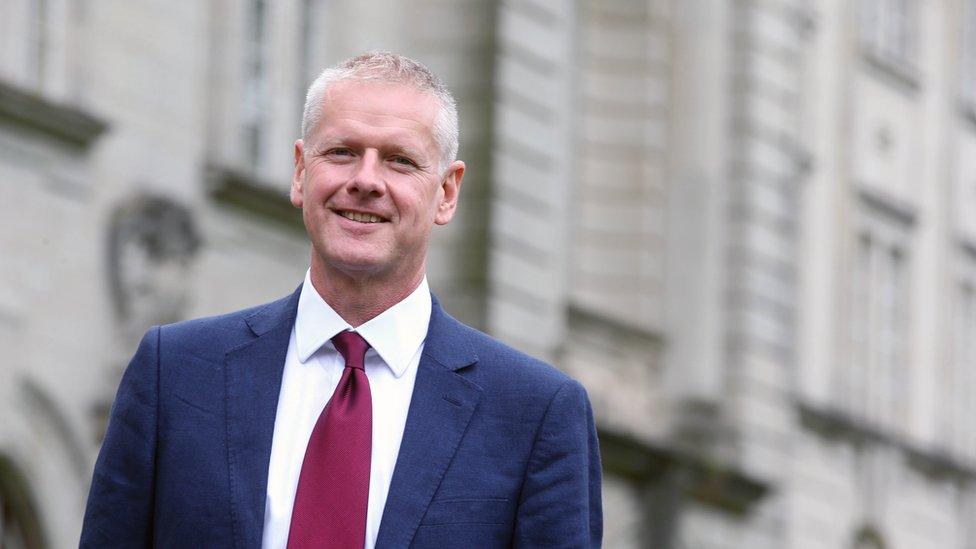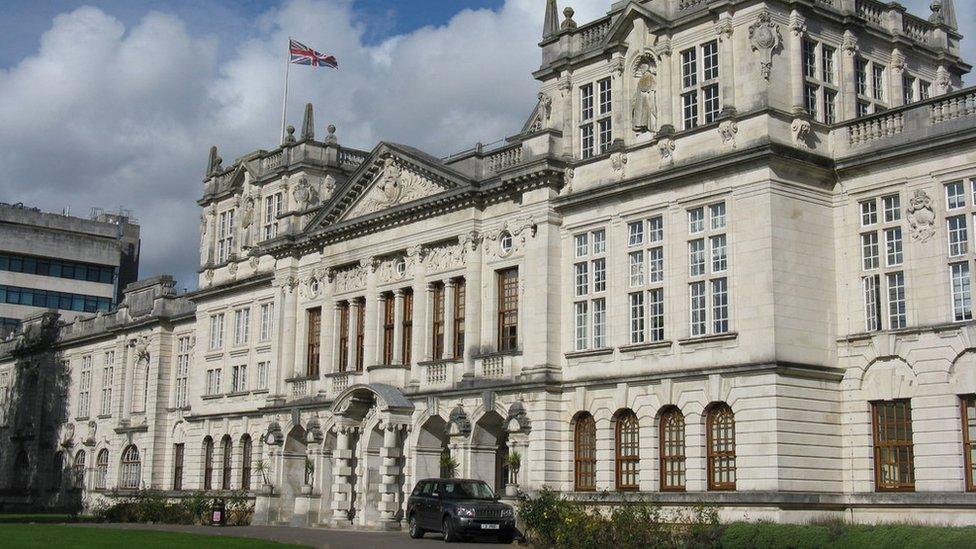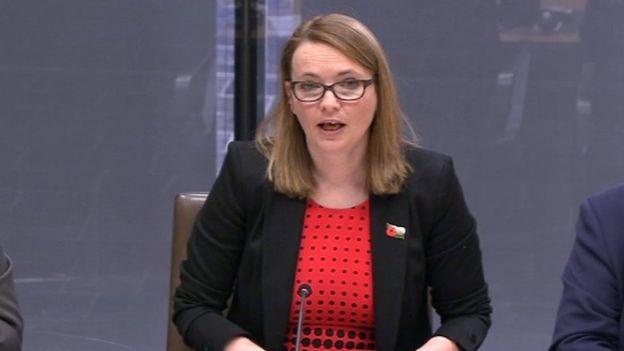Coronavirus: University cap 'won't see English student raid'
- Published

Prof Riordan believes the loss of international students will hit admissions hard
English universities will not be able to "raid" Welsh institutions for students under UK government plans to cap enrolments, a university boss said.
The move is aimed at stopping Welsh, Scottish and Northern Irish universities recruiting more than their "fair share" of England-based students.
Welsh Education Minster Kirsty Williams raised concerns last week.
But Cardiff University vice-chancellor Colin Riordan said it should not affect the institution.
"Fortunately the way in the which the home cap has been introduced means it shouldn't really affect us," he told BBC Radio Wales Breakfast.
"Our initial fear was that there would be a particular cap on Wales but that's not the case, the cap will apply to English institutions too, in which case it wouldn't be possible for English universities to raid Welsh students for English universities, so that's helpful."
Prof Riordan said about 40% of Cardiff's undergraduates come from England and the fear was, with a drop in international students because of the pandemic, some individual universities may recruit more that are UK-based.
This would deprive other institutions that would get into "serious financial difficulty", he added.
However, he said: "What they've proposed is we'd be able to accept the same numbers as we were able to take in last year plus 6.5%, which allows growth in the system.
"I think that's a reasonably fair result.
"The only problem is that although it was all agreed some weeks ago, there was obviously no consultation with the Welsh Government about this which means the Welsh Government now has to decide what happens so far as Welsh students are concerned without any consultation or discussions in advance."

Cardiff University officials hope the cap will not affect it
Overall, he described it as "very, very serious crisis" that will mainly be caused by a reduction in foreign students, adding: "It could be drops in income of hundreds and millions of pounds."
The temporary cap was announced on Monday to prevent over-recruitment by higher education institutions trying to make up for lost revenues caused by the coronavirus pandemic.
It will see intake for universities capped at the 2019-2020 level plus 6.5%.
Prof Elizabeth Treasure, vice-chancellor of Aberystwyth University, said it had been a "real surprise" to receive a letter from an English minister "rather than that being communicated in conjunction with and in agreement with Welsh Government".
She said the university had seen a "significant increase" in applications and the cap could potentially reduce the number of students it can admit from England.
"That's a real shame when Welsh universities offer such a high level of student satisfaction and education across the country," she added.
And Aberystwyth businessman Aled Rees, who is involved in a burger restaurant, said the cap was a concern for traders.
"Aberystwyth basically lives on tourism and students," he said.
"We're likely not to see much tourism this year and having the student numbers capped would be worrying for us as business owners."
Institutions in the devolved nations that exceed their quota of students from England will see a reduction in loan receipts from the Student Loans Company of between 3% and 15% in the following academic year.
UK government universities minister Michelle Donelan said the measures were intended to stabilise the admissions system.

Kirsty Williams said she was "disappointed" by the approach of the UK government
"The measures seek to ensure students have the widest possible variety and most suitable places to study in the coming academic year, while avoiding harmful over-recruitment among providers which could go against the interests of students and the sector," she said.
English universities that exceed their intake will also be penalised financially through a loss of tuition fees, which could be cut by up to 15% in the following academic year depending on how far they exceed their quota of students.
'Deeply concerned'
The cap only applies to full-time UK and EU undergraduate students, while students sitting their exams this autumn instead of accepting a grade determined by teachers will also be exempt.
Welsh Education Minister Kirsty Williams had said she was "deeply concerned" this "control was placed on Welsh institutions" and wanted a solution that was "compatible with devolution".
She tweeted: "I disagree strongly with England's approach on this matter.
"I respect decision making in and for England, just as I do for the other governments in the UK."
- Published29 May 2020

- Published29 April 2020
